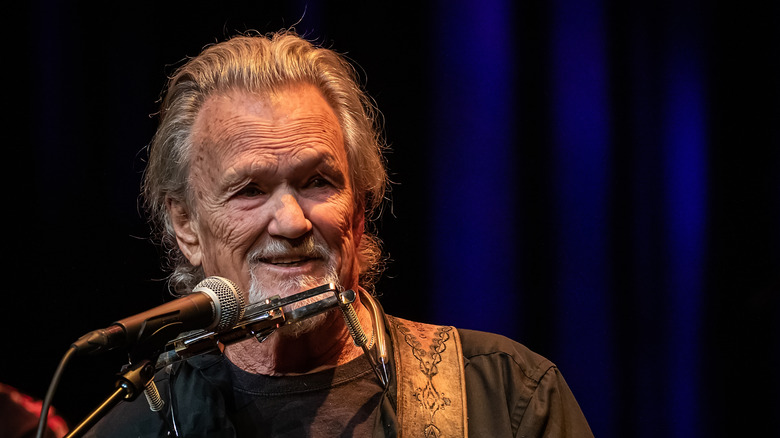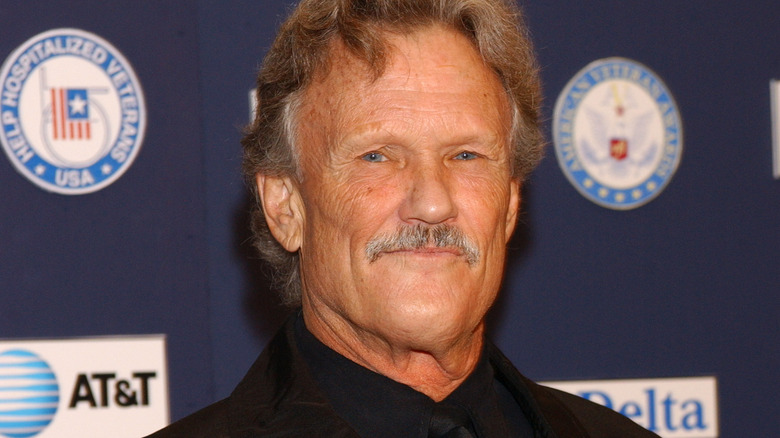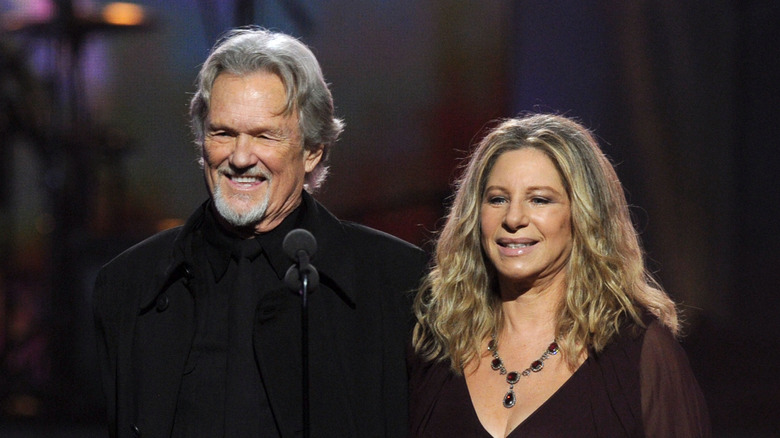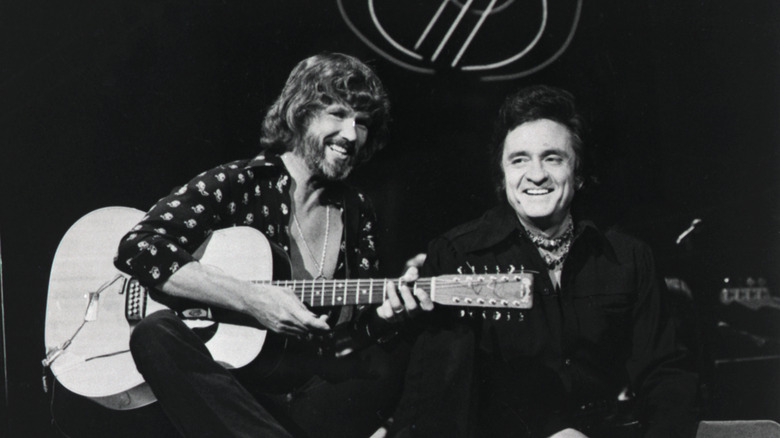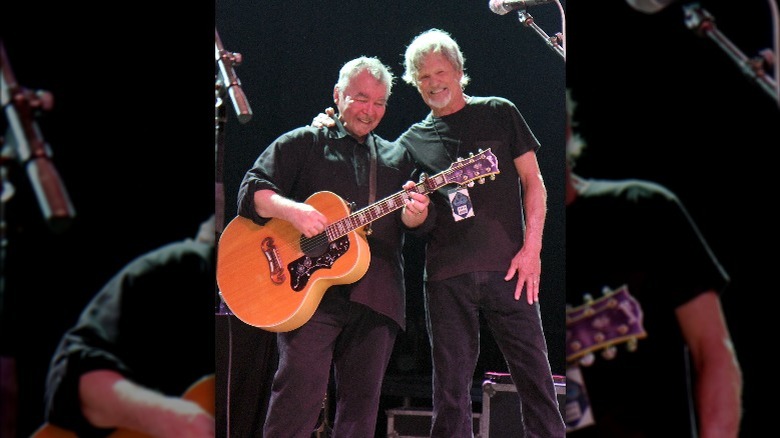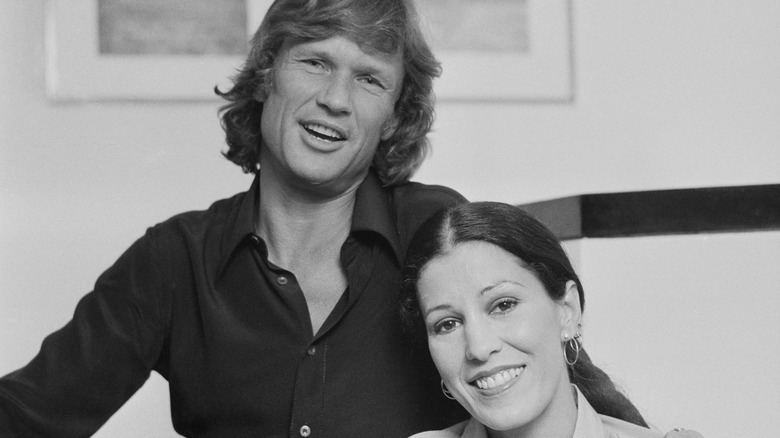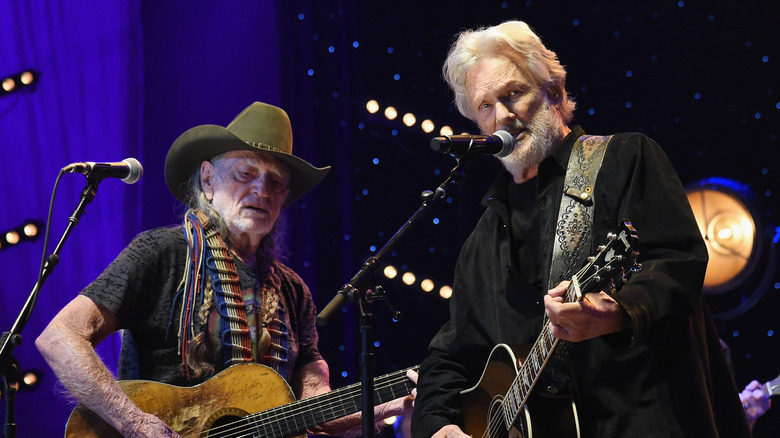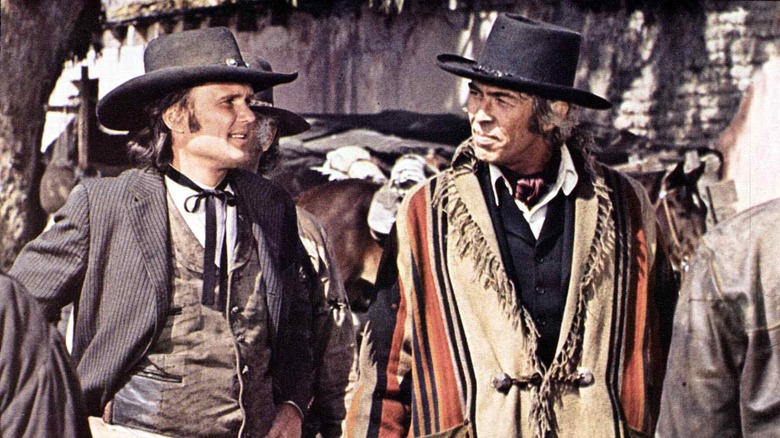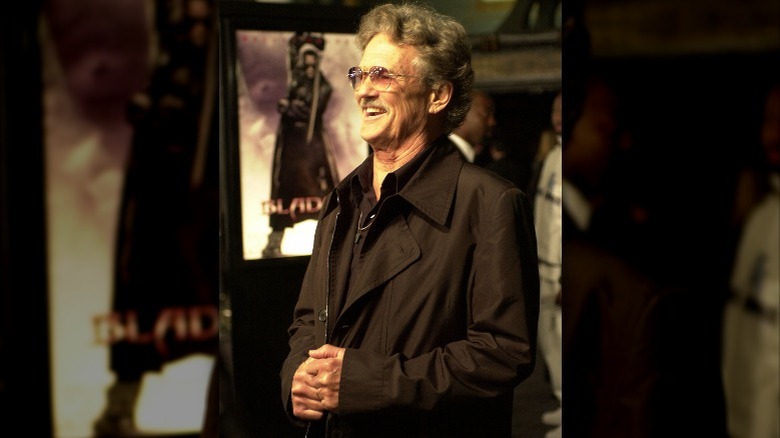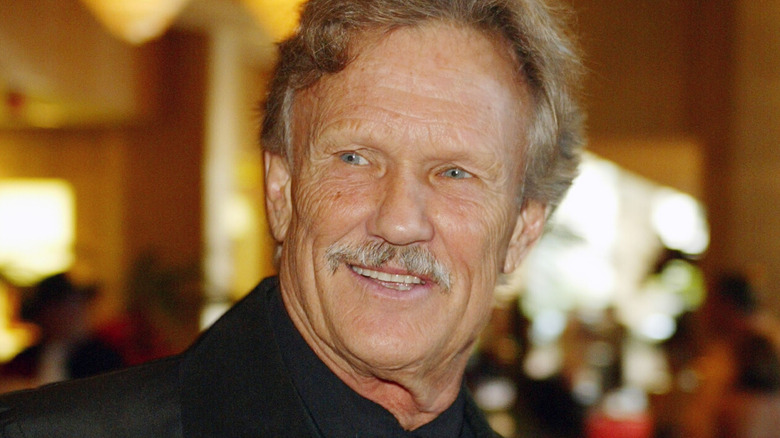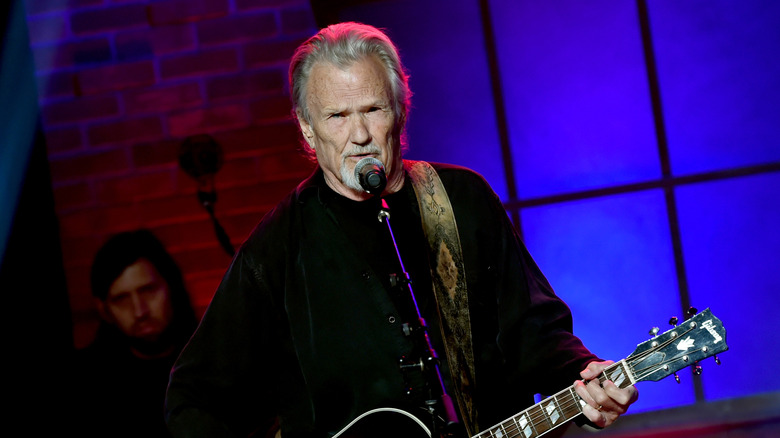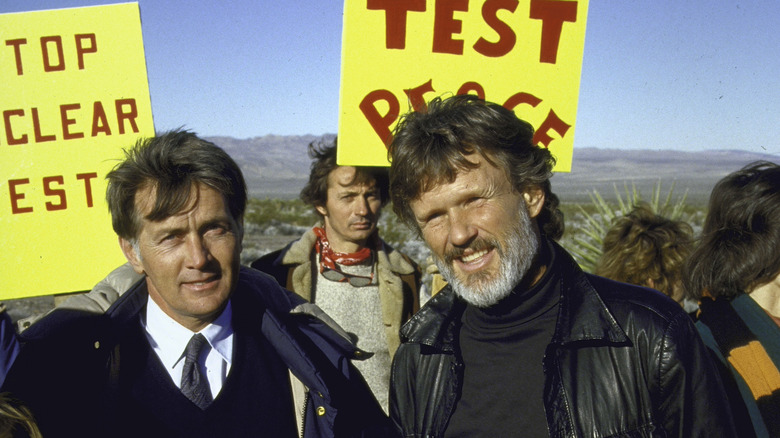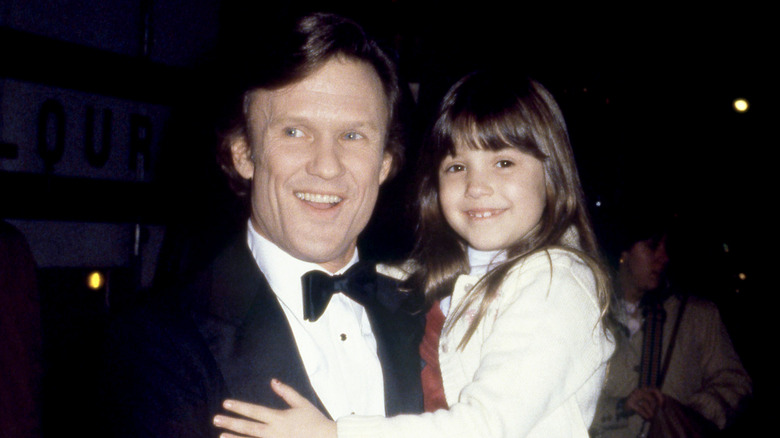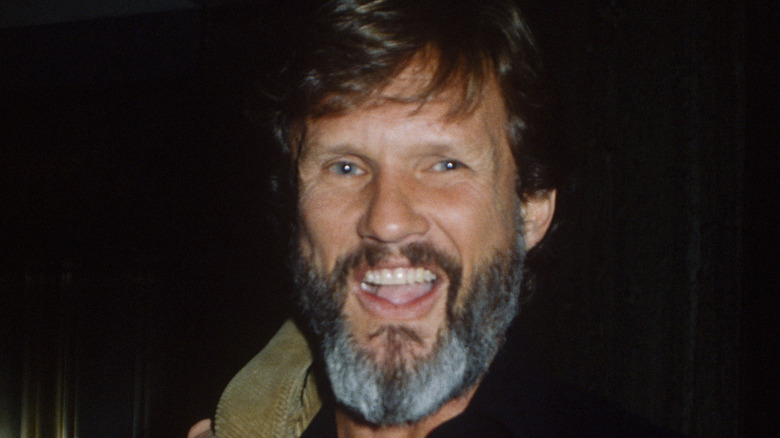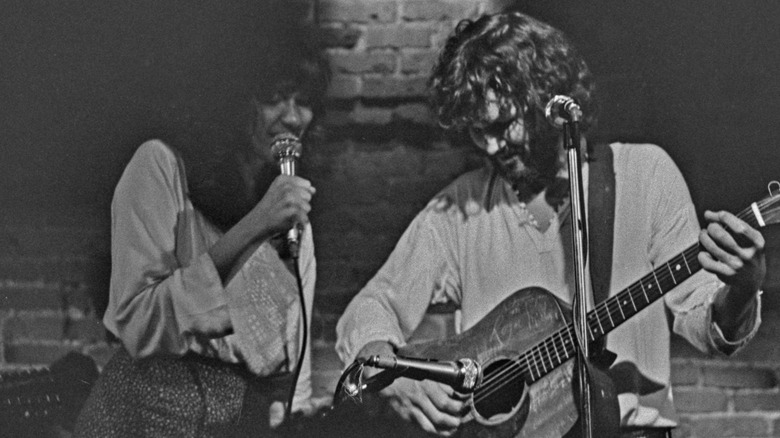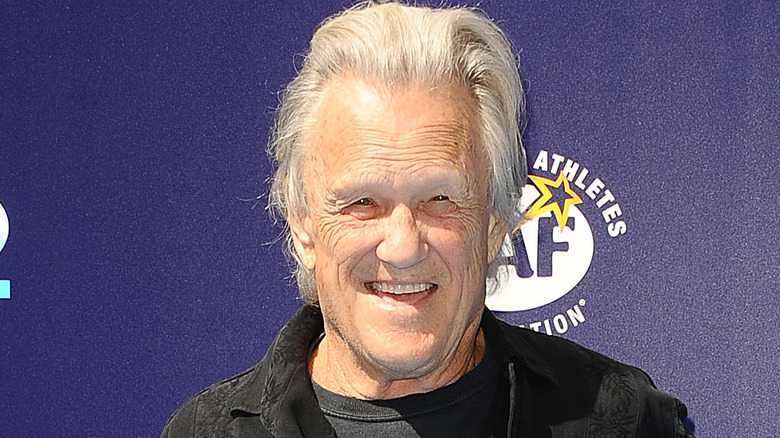Kris Kristofferson: 16 Facts About The Country Singer
Think of a face associated with "country music," and one of the first to pop into your head will be the rugged but sensitive visage of Kris Kristofferson. The man is a superstar of that all-American art form, particularly its renegade, story-song branch. That tracks because Kristofferson has squeezed a lot of living into his eight decades on Earth. At his peak of fame and popularity in the '70s and '80s, he was the very definition of the era's macho ideal — tough, but in touch with his emotional side, too — in all of his work.
At various points, Kristofferson has been a hustling musician, a marquee concert draw, an actor, a sex symbol, an athlete, a writer, and many other things. Forget that other old, bearded guy from the beer commercials — Kristofferson has a far greater claim on being the most interesting man in the world. Here's an overview of the fascinating and multifaceted life of Kris Kristofferson.
He studied at Oxford
Kris Kristofferson was born in Texas, albeit into a military family, which made for an itinerant childhood. Eventually, he settled down in San Mateo, California, and enrolled at Pomona College. Kristofferson became a three-sport collegiate star in football, rugby, and track and field. He also boxed on his own, achieving Golden Gloves honors for his abilities. But Kristofferson was also a really good student, studying creative writing and earning his bachelor's degree.
He graduated with honors and was inducted into the Phi Beta Kappa Society but then went to an even older and more prestigious academic organization — Kristofferson showed such promise and literary acumen that in 1958, he was awarded a Rhodes Scholarship, entitling him to study English literature at Merton College, a constituent school of the famed and ancient Oxford University. He was just as active in post-grad as he was as an undergrad, continuing to play rugby and box while also starting to write songs and perform in small venues under the name "Kris Carson."
He was a military helicopter pilot
After finishing up at Oxford, Kris Kristofferson abandoned the literary and artistic paths laid out for him and instead went into the family business. Taking after his father, a major general in the US Army, Kristofferson returned to America, enlisted in the military, and enrolled in Ranger School, training to become a helicopter pilot. Kristofferson later admitted to Military.com that pressure from his family is what led him to enlist. Also, he owed the government some active duty, having successfully deferred service when he was named a Rhodes Scholar.
As a member of the Army's Airborne Rangers, he reached the rank of Captain while stationed in Germany. When his hitch ended in 1965, Kristofferson received an honorable discharge but was subsequently offered a job that would've kept him in the military fold while also allowing him to explore what he'd studied at Oxford: English literature professor at the prestigious and rigorous United States Military Academy at West Point. He had other plans and aspirations, and when he decided to follow those, his family disowned him, according to Rolling Stone.
Before his own career took off, he was an in-demand songwriter
Kris Kristofferson walked away from the military because he'd realized he wanted to pursue songwriting professionally. As luck would have it, a friend's cousin was country songwriter Marijohn Wilkin, and after she liked some tunes he sent her, he headed for Nashville in 1965. "I'd been writing songs since I was 11 years old," Kristofferson told Cowboys & Indians. "And I knew immediately that this is where I belong." Despite having an industry connection, Kristofferson toughed it out and tried to sell songs to numerous labels on Music Row to no success, paying the bills by working as a janitor at Columbia Records' studios in Nashville, where he swept floors and emptied ashtrays used by the likes of George Jones, Bob Dylan, and Johnny Cash.
It ultimately took Kristofferson five years to catch a break, but then seemingly every big country star wanted to record a Kristofferson composition. Faron Young took "Your Time's Comin,' " Waylon Jennings grabbed "The Taker," Ray Price recorded "For the Good Times," Sammi Smith hit big with "Help Me Make it Through the Night," and Roger Miller took a stab at "Me and Bobby McGee," which rock star Janis Joplin heard, re-recorded, and took to No. 1 on the Billboard pop chart. By that point, Kristofferson had become a recording artist himself, releasing two albums, "Kristofferson" and "The Silver Tongued Devil and I."
He broke into the industry with help from Johnny Cash
Working at a Nashville studio made for some great people-watching for Kris Kristofferson. He witnessed Bob Dylan record "Blonde on Blonde" there, but he never introduced himself, nor did he dare hand a demo tape to frequent guest Johnny Cash. Instead, he snuck them to Cash's wife, June Carter, who'd play them for her husband, who was so uninterested that he'd throw them out the window, right into a lake.
Kristofferson resorted to more creative tactics in order to get the legendary Cash to listen to his songs and help him get a leg up in the music industry: Still a helicopter pilot as a member of the Army Reserve, he went off-course on a flight training mission one morning and headed for Cash's estate. He landed the copter on Cash's lawn, surprising the country legend. Cash says Kristofferson walked up to him, beer in hand, and passed along a demo tape of "Sunday Morning Coming Down." A few days later, on "The Johnny Cash Show," Cash played the song, which hit No. 1 on the country chart in 1970. Kristofferson remembers things a little differently. While he did land a chopper on Cash's lawn, he claims the singer fabricated some details. "He wasn't even in the house," Kristofferson told Cowboys & Indians. "And I never would have been drinking while flying a helicopter."
Kris Kristofferson discovered John Prine
In 2020, the late John Prine was honored with a Grammy Lifetime Achievement Award, capping a nearly 50-year career as one of America's most acclaimed and singular singer-songwriters that includes such modern country, folk, and Americana standards as "Angel from Montgomery," "Illegal Smile," and "Mexican Home." All that success — and an audience of millions — might not have happened were it not for the intervention of fellow musician Kris Kristofferson.
In 1971, Kristofferson played a four-night stand at the Quiet Knight club in Chicago, with Prine's friend Steve Goodman as his opening act. Prine was gigging elsewhere across town, and Goodman persisted each night in trying to get Kristofferson to go hear his friend play. Finally, on the last night, Kristofferson relented and saw Prine play to a nearly empty club on a Sunday night, at about 2:00 AM. "I got on the stage right in front of him and sang about seven songs. And then he bought me a beer and asked if I could get back up there and sing those seven again and anything else I wrote," Prine told Billboard. Most of those songs appeared on Prine's first album, recorded and released later that year after Kristofferson helped introduce him to the right people in the music industry. "It was really a Cinderella story, truly," Prine said.
He had a complicated love life
Equal parts celebrity, wandering troubadour, and restless artist, it shouldn't come as a surprise that Kris Kristofferson has loved and lost love a few times. The singer-songwriter has been married several times, while also enjoying long and public romances with many of his '70s musical contemporaries. He briefly dated Janis Joplin, who made Kristofferson's "Me and Bobby McGee" her signature song. According to the Pittsburgh Post-Gazette, he didn't even know she'd recorded the song until after her death in October 1970.
According to the Los Angeles Times, he also once dated Patti Davis, a writer and often estranged daughter of President Ronald Reagan and Nancy Reagan. Folk icon Joan Baez told the Chicago Tribune of her dalliance with Kristofferson, while Carly Simon wrote in her memoir of an ill-fated "slam-dunk deranged month or so" spent with Kristofferson. At the height of Kristofferson's fame — 1973 to 1980 — he was married to fellow singing star Rita Coolidge, with whom he recorded the album Full Moon. He's been happily married to Lisa Meyers since 1983.
The Highwaymen was a happy accident
In 1984, Johnny Cash was filming the holiday TV special "Christmas on the Road" in Montreux, Switzerland, and he implored some friends and colleagues to join him. They just so happened to be three of the biggest names in country music: Willie Nelson, Waylon Jennings, and Kris Kristofferson. After taping all day, they'd head back to the studio to jam well into the evening, and they realized that they played together so well that they might as well form a supergroup and cut an album, according to Rolling Stone. The first record, released in 1985, wasn't credited to a group but rather Jennings, Nelson, Cash, and Kristofferson, individually.
The project was a landmark country event. Titled "Highwayman," the single of the same name hit No. 1 on the country music charts, and the follow-up, "Desperados Waiting for a Train," hit No. 15. The album's name soon became the group's name (sort of): the Highwaymen. In addition to establishing themselves as the tastemakers and godfathers of modern country music, and laying the groundwork for other monumental collaborations (particularly "Trio," the smash hit one-off by Dolly Parton, Emmylou Harris, and Linda Ronstadt), the Highwaymen became a pop culture machine. The foursome also starred together in the 1986 made-for-TV movie "Stagecoach" and four discs' worth of audio dramatizations of classic Louis L'Amour western stories. In 1990 and 1995, the Highwaymen reconvened to record more albums.
He was a huge movie star for a time
Hollywood found a place for Kris Kristofferson. In the early '70s, he starred in several cult classics, including Sam Peckinpah's 1973 Western "Pat Garrett & Billy the Kid' – Kristofferson played the latter title character and earned a Most Promising Newcomer nomination at the BAFTA Awards. Peckinpah recruited Kristofferson to play a biker in his next feature, the underworld drama "Bring Me the Head of Alfredo Garcia." From there, Kristofferson jumped to leading man status as rancher David, love interest for a world-weary waitress in Martin Scorsese's "Alice Doesn't Live Here Anymore." Able to play romantic leads while also boasting a musical background made Kristofferson the perfect choice to play John Norman Howard, the fading rock star who discovers an exciting new talent (played by Barbra Streisand) in the hit remake of "A Star is Born." Kristofferson won a Golden Globe for his performance.
Late in the decade, Kristofferson agreed to star in "Heaven's Gate," a slow, meditative, experimental sort of Western about a little-known land dispute in 1890s Wyoming, from up-and-coming "The Deer Hunter" filmmaker Michael Cimino. Significantly over-budget and over-schedule, the film is regarded as one the biggest bombs in Hollywood history. It also killed Kristofferson's acting career for years. "I'm sure it knocked me off the course I had been on right then," he told the Los Angeles Times. "I think that it made me, for a while, unmarketable."
One of his film roles became a comic book character
Kris Kristofferson's acting career got back on track in the '80s and '90s, with roles in "Big Top Pee-wee" and "Lone Star," but easily his best-known and most appreciated post-"Heaven's Gate" role is that of Abraham Whistler in "Blade." A man shattered by the loss of his entire family to vampires, he takes teenage vampire Blade into his care, gives him a serum he developed to quell the blood hunger, and trains his young charge in his profession: vampire hunting.
While the "Blade" trilogy is based on Marvel Comics titles, Whistler did not originate in print — "Blade" screenwriter David S. Goyer invented him. "I thought it would be interesting for Blade to have a teacher," Goyer told The Comics Continuum. "The aging gunfighter who passes down his knowledge." Goyer first considered Patrick McGoohan or Jon Voigt for the role, until he was blown away by Kristofferson's performance in "Lone Star." Kristofferson so enjoyed playing Whistler that he returned for two "Blade" sequels. Marvel so enjoyed Kristofferson playing Whistler that after the movies came out, the publisher added Whistler to the comics.
He's a frustrated author who has never published a book
Before he ever went to Oxford University, before he ever sold a song, recorded one, or starred in a movie, Kris Kristofferson was a very talented and accomplished writer of prose. By the time he graduated from Pomona College, he'd already placed very highly in short story contests conducted by Atlantic Monthly, the prestigious journal of literature and culture. His story "A Rock" took first place in one competition, while "Gone Are the Days" placed third in another.
While Kristofferson moved on to other creative pursuits, especially songwriting, he never stopped composing prose. According to Rolling Stone, his home in Maui is full of trunks that are full of notepads full of short stories, novels, and journal entries stretching back to Kristofferson's college years. Although he really wished to pursue a literary career, not a word of these works has been published. In the 2010s, he landed a book contract to publish his memoir, which he canceled because he bristled at having to work on a deadline.
He suffers from memory problems
A cruel twist in the story of Kris Kristofferson, a man whose life has been overstuffed with one adventure and accomplishment after another: He couldn't remember a lot of it. According to Rolling Stone, the singer-songwriter began to suffer memory loss in his 70s, which doctors attributed to either an encroaching case of Alzheimer's disease, or dementia caused by repeated strikes to the head suffered during his days boxing and playing football and rugby when he was a high school and college student. Kristofferson's mental deterioration got to the point where he'd forget what he was doing in the middle of activities, and his attempts to write a song about it faltered.
Kristofferson was left to accept this fate until 2016, when he tested positive for Lyme disease. Proper treatment for that condition, along with dropping the strong medications he was taking for Alzheimer's, combined to largely restore Kristofferson's mental acuity. "Some days he's perfectly normal and it's easy to forget that he is even battling anything," his wife, Lisa, said. Kristofferson believes he first contracted the sickness from a tick bite he got while shooting the movie "Disappearances" in the Vermont forest in 2006.
His politics have gotten him in trouble
In the late '70s, the far-left-wing (meaning communist-leaning) Sandinistas successfully staged a revolution in Nicaragua. They faced violent resistance from the Contras, a group financially backed by the Ronald Reagan administration. Kristofferson publicly favored the Sandinistas, even making trips to Nicaragua. "I'm a supporter, I know it's not hip to be," Kristofferson told The Washington Post. In 1987, he was among 10,000 at a pro-Sandinista rally in Nicaragua, where he performed his song "Sandinista." His support for left-wing causes cost him fans — and after he spoke out against the Gulf War in 1991, protestors picketed his shows.
Kristofferson has angered progressives, too. In 1987, ABC aired "Amerika," a miniseries about life in the U.S. after a Soviet coup. Kristofferson starred as a patriotic freedom fighter. Around that time, he attended a protest in Nevada, one among 2,000 opposed to the United States' Cold War move to resume nuclear testing. "As you can imagine, the place was full of people who were violently opposed to the film," Kristofferson told The Washington Post. "This woman came up and said, 'You can't atone for "Amerika" by doing this.'" Kristofferson had very mixed feelings about the miniseries: "I did not want to be involved in anything that increased Cold War tensions," he said, "but the fact is that the film was going to be made, and I felt that it was important that the part of the hero be played by somebody coming from my position."
He's got a lot of kids
Kris Kristofferson is a prolific musician and actor, and he's enjoyed a well populated personal life, too. The entertainer has been married three times, and he's the father of eight children altogether. In 1961, Kristofferson wed Fran Beer, and the marriage produced two children. Daughter Tracy Kristofferson (born in 1962) dabbled in acting in the 1980s and 1990s, costarring with her father in "Trouble in Mind," "Night of the Cyclone," and "Another Pair of Aces: Three of a Kind." Kris Kristofferson Jr. was born shortly before his parents' divorce in the late 1960s. Daughter Casey, whose mother is singer Rita Coolidge, to whom Kristofferson was married from 1972 to 1980, fronts and writes rock and Americana ballads for the Casey Kristofferson Band.
When Kristofferson married Lisa Meyers, they built a large family, welcoming five children. Their eldest, Jesse Kristofferson, took a run at acting in the 2010s, appearing on TV shows like the "Melrose Place" reboot, "Days of Our Lives," and "Bloodline." Jody Kristofferson wrestled in the WWE's second-tier, developmental circuit and independent promotions under the name Garrett Dylan. Johnny Kristofferson graduated from Pepperdine University's law school and works as an attorney in California. Kelly Marie Kristofferson turned to the movies, appearing in a few 2010s short films and producing the 2026 mystery "Little Lamb." She's an occasional musician, too, singing "The Wonder" with her father onstage in 2013. Youngest son Blake was born in 1994.
He made beards a thing
Among the many cultural phenomena experienced by Americans in the 1970s — thick, voluminous beards on men, and the mainstream, crossover popularity of country music. Those two things are related, and Kris Kristofferson contributed significantly to interest in both.
Kristofferson's first wave of popularity came in the early 1970s, same as the rise to national prominence enjoyed by Willie Nelson. Neither of them sported beards at first. Nelson grew his after Kristofferson, although Kristofferson claims his choice to wear bushy, unkempt facial hair was entirely based on happenstance. "I had pneumonia and I had to go into hospital for a week, didn't shave the whole time," he told The Guardian in 2008. "And when I came out, some magazine took a picture of me and called it 'the new face of country music.' Ever since then WIllie, too, has just looked as wild as heck." Other bearded country guys, like Hank Williams Jr. and Waylon Jennings, also saw their profile and record sales rise, and they, like so many other American men at the time, sprouted beards.
He's so vain, he might think this song is about him
Even more than 50 years after its initial release, "You're So Vain," a No. 1 hit, remains one of the most tantalizing mysteries in pop music. Carly Simon wrote and performed the lyrically scathing tirade about an arrogant, self-absorbed, abhorrent man, and probable former lover, unidentified in the song and subsequently unnamed in the years since despite great public interest in such a revelation. It's about a famous male involved in some way in the entertainment industry, and candidates floated by insiders and reporters over the years include music mogul David Geffen, Simon's ex-husband James Taylor, actor Warren Beatty, and Rolling Stones frontman Mick Jagger. One other possibility: singer-songwriter-actor Kris Kristofferson.
He's a potential subject because the two musicians did date briefly before Simon wrote "You're So Vain." When bluntly asked by a Rolling Stone reporter in 1974 if the song is in fact about him, Kristofferson offered his opinion: "I heard it was about Warren Beatty," he quipped, before offering a full denial based on a couple of stray lyrics not matching his description. "I sure don't think it's me, I never had a Lear jet or went to Nova Scotia."
He lost a lot of major film roles
Concurrent to his steady work as a musician, Kris Kristofferson has been an actor, too, appearing in beloved films and big hits alike, including "Alice Doesn't Live Here Anymore," "Pat Garrett & Billy the Kid," "Heaven's Gate," and "Blade." In the 1970s and 1980s, Kristofferson's acting services were so in demand that he nearly starred in multiple big movies that went on to be very good choices for other performers. The first "Rambo" movie is based on David Morrell's 1972 novel "First Blood," a tragic examination of a PTSD-stricken Vietnam War combatant struggling to return to civilian life. Prior to Sylvester Stallone landing the part, producers almost cast Kristofferson.
The actor got as far as signing up to appear in the 1979 World War II drama "Hanover Street," set to portray a fighter pilot. Then Kristofferson caught a viewing of his 1976 small-town action movie "Vigilante Force" and was so repelled by his own acting that he backed out of "Hanover Street," ceding the role to Harrison Ford. Kristofferson also could've been the big screen's "Man of Steel" — he rejected the opportunity to star in 1978's "Superman."
